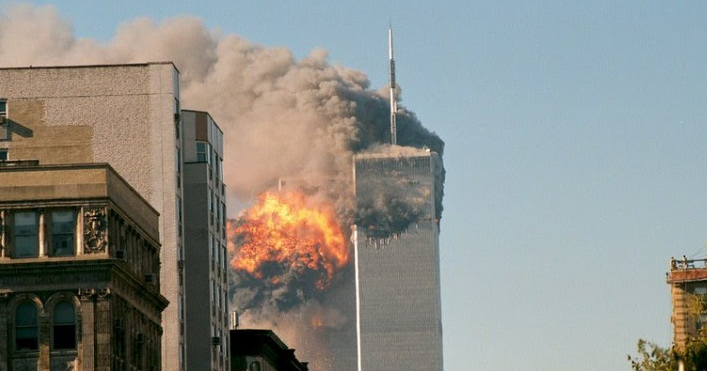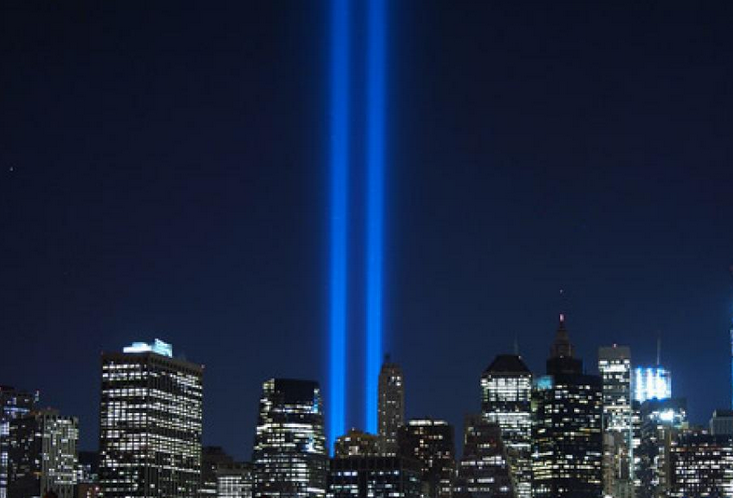How 9/11 Ended the Banality of Evil
The murderous destruction of an American landmark on live television on Sept. 11, 2001, set the stage for a new, more dramatic form of psychological warfare.

Lisa Van Dusen
September 10, 2020
Nineteen years ago this week, two passenger jets loaded with hostages to history, self-styled martyrs, and weaponized jet fuel hit the World Trade Center towers in lower Manhattan, marking the unofficial dawn of the new millennium.
In “Where were you?” terms, watching New York and America live through the shock and aftershocks of 9/11 from the relative calm of Montreal was for me—as it was for most of the rest of the world—heartbreaking. My 11-year-old daughter and I had left Manhattan that spring, having lived there for a year after eight years in Washington, D.C.
Over the previous year working in New York as an international news writer at ABC, I’d screened, every afternoon, the London feed of raw foreign video that included all the human damage inflicted by terrorism from Colombo to Jerusalem to Northern Ireland; the aftermath scenes of whole lives reduced to scattered, inanimate objects in the blink of an eye.
Aside from the enormous geopolitical and security consequences unleashed on that Tuesday morning, 9/11 was different from other terrorism because the logistics of the attack repurposed the element of surprise for maximum suffering.
The emotional impact of 9/11 registered not primarily in its aftermath, but in the visual of the second plane hitting the South Tower of the Trade Center 20 minutes after the first plane hit, when the eyes of the world were already focused on the scene of a crime yet to be committed. As I wrote later in a piece for the Montreal Gazette referencing Hannah Arendt on the prosaic larceny of the Nazis, “If someone can organize it well enough to watch their own terrorism live on CNN, then the banality of evil is a thing of the past.” It was a line that, at any other moment, would have seemed hyperbolic and that, tragically, seems to have been borne out in the two decades since.
It may be that the late, unlamented Osama bin Laden’s most significant legacy was as the diabolical pioneer of a uniquely 21st-century brand of psychological warfare based on the disarming, demoralizing power of collectively witnessing the previously unthinkable.
Notwithstanding the Clash of Civilizations, Samuel Huntington-citing predictions that challenges to the world order would henceforth be based on cultural and religious differences, things have unfolded quite differently since 9/11. As an election looms that could deliver a much more powerful blow to the liberal world order than any mastermind in a cave ever did, the success or failure of this attempt will be based not on religion, culture, or ideology but on narrative warfare and the hypercorruption that enables it.

The story line from 2001 to today goes through the post-9/11 corruption of the intelligence community, of journalism and of integrity as the cover for an empty Iraq war casus belli, and in the many ways the scaling up and mainstreaming of that corruption has produced avoidable, cruel-and-unusual catastrophe after catastrophe.
The bookend to 9/11, as far as the commodified degradation of America goes, was not really the death of bin Laden in 2011. It is the previously unthinkable circus the world is witnessing now, as an impeached, toxic, preposterous and perpetually self-immolating president avails himself of all the elements of post-9/11 democracy-degradation—includin
Nineteen years later, amid the transformation of the United States into a besieged propaganda battleground, those who stand to benefit so tremendously from a previously unthinkable outcome have been doubling down on shock and awe, with banality, if not evil, a speck in the wing mirror of history.
Lisa Van Dusen is associate editor of Policy Magazine and a columnist for The Hill Times. She was Washington bureau chief for Sun Media, international writer for Peter Jennings at ABC News, and an editor at AP in New York and UPI in Washington.
